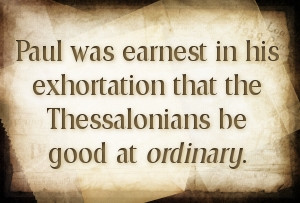Guarding Integrity for a Persevering Ministry
Republished with permission from Baptist Bulletin © Regular Baptist Press. All rights reserved.
As iron sharpens iron,
one person sharpens another. (Proverbs 27:17)
Republished with permission from Baptist Bulletin © Regular Baptist Press. All rights reserved.
The previous post on this subject presented reasons people leave one church for another and concerns that our pastors have about this practice. Let me say again, there are legitimate reasons for leaving a church and going to another one in the same community. It may seem that I should discuss those reasons in these articles. But I want to focus on problematic church-hopping rather than the acceptable variety.
For church members who are considering making the jump to another church in your community, may I encourage you to walk through the questions I listed at the end of the previous post. You may not realize how important you are to your church, how much people care about you, and how your decision will affect you, your family, and the churches involved. Please take the time to prayerfully and honestly consider your answers to those questions.

Highlights. We are addicted to highlights. We subject ourselves to a continuous media stream telling us what is noteworthy and what isn’t. Is it re-tweetworthy? Is it worth a share or a status update? We have come to value style over substance and flash over fundamentals. Of course, nothing is inherently wrong with highlights, style, or flash, but when these captivate our attention fully, we are in trouble. We can quickly lose our appreciation for and connection to ordinary.
We have teachers and teachings advocating a kind of Christianity that is “radical” and a kind of love that is “crazy.” They tell us we should consider the status quo an enemy and fight to enjoy our best life now, and to make sure we are driven full throttle by purpose. We begin to place ourselves in bondage, wondering if what we are doing is significant enough. We feel guilted into wishing for bigger and better things—for more fulfilling roles and more substantial ministries. But in our zeal for a kind of Christianity that makes a difference or that matters, we have become focused on outcomes and mountaintop moments. In doing so we are prone to overlook something important.

One of the most interesting words in the English language is hagiography. One of its definitions is the one I have in mind, an “idealizing or idolizing biography.” The idea is that once someone has died, we remember the individual as being better than he or she actually was. This adjusting of memory and idealization of those who lived before us is common throughout the human race.
But people “back then” were really not as wonderful as we think they were.
This is universally done with the folks who made up the very early church. Although the very early church had its strong points (the Apostles were around to teach and lead, God worked some unprecedented miracles like raising the dead, etc.), the people who made up the early church community were far from wonderful.
Consider the words of the New Testament itself about the believers who made up the family of faith. In Corinth, we notice a man sleeping with his stepmother (1 Cor. 5:1) while fellow Christians in the church accepted this brother as someone in good standing. The Corinthian church was divided into factions, each following the unique perspectives of a famous Christian leader (1 Cor. 3:4-5).
Things were so bad at Corinth that during their carry-in dinners members were consuming all the food before all arrived; some even became drunk while they waited (1 Cor. 11:21). The Corinthian Christians invented the “happy hour.”
Discussion